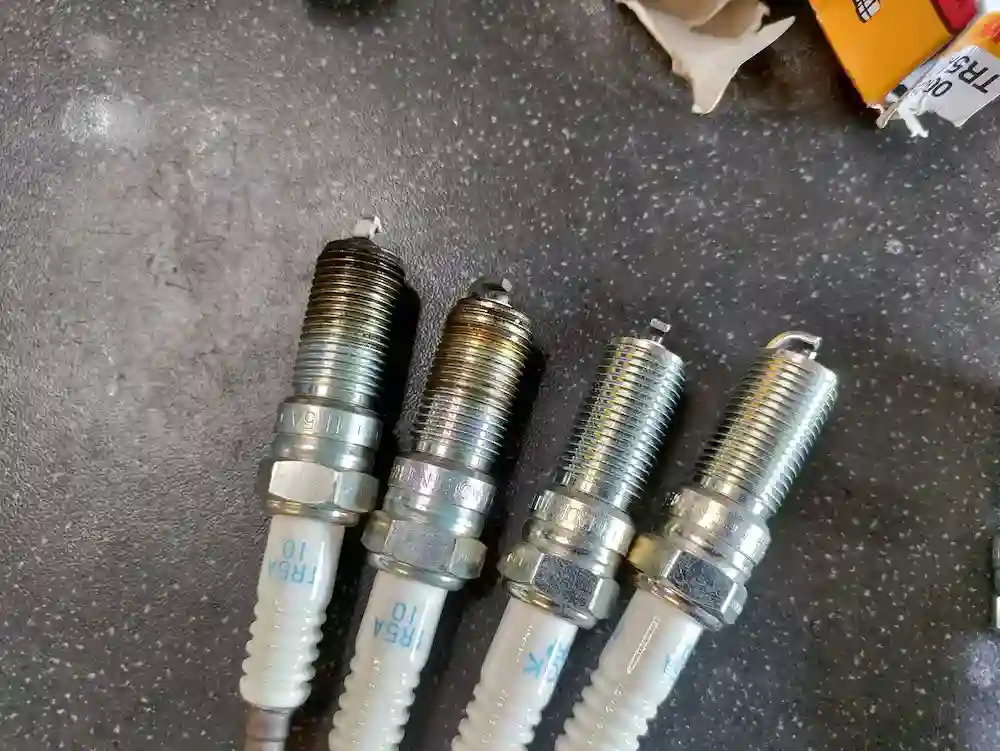- What Causes a P0171 Code in a Nissan?
- Diagnose and Repair a P0171 Code in a Nissan?
- Symptoms of a P0171 Code in a Nissan?
- How to Prevent Future P0171 Codes?
- What Are the Most Common Reasons?
- Is It Safe to Drive With A P0171 Code?
- Should I Replace or Repair Parts?
- Benefits of Regular Maintenance
- O2 Sensor Causing A Check Engine Light
What Causes a P0171 Code in a Nissan?
A P0171 code in a Nissan is caused by an imbalance between the air and fuel ratio in the engine. This imbalance can be caused by a variety of factors, including a vacuum leak, faulty fuel injectors, or an intake manifold gasket leak. It can also be caused by a faulty mass airflow sensor (MAF) or oxygen sensor (O2).
In some cases, it may even be due to incorrect spark plug gap settings or worn spark plugs. To diagnose and repair this issue, it is important to first identify the source of the problem. A qualified technician should inspect all components related to air and fuel delivery for any signs of damage or wear.
They should also check for any vacuum leaks that could be causing an imbalance in air/fuel ratios. Additionally, they should inspect all sensors related to air/fuel delivery such as MAFs and O2s for proper operation. Finally, they should check the spark plug gap settings and replace any worn-out plugs if necessary.
How to Diagnose and Repair a P0171 Code in a Nissan?
Diagnosing and repairing a P0171 code in a Nissan can be a difficult task (as it would otherwise be in other cars, like the P0171 code in a Chevy Cruze). However, with the right knowledge and tools, it is possible to diagnose and repair this issue.
- The first step in diagnosing and repairing a P0171 code is to check the fuel system for any leaks or blockages. This includes checking the fuel injectors, fuel lines, fuel filters, air filters, vacuum hoses, intake manifold gaskets, and other components of the fuel system. If any of these components are found to be faulty or blocked then they should be replaced or repaired as necessary.
- Once all of the components have been checked for faults or blockages then it is time to move on to testing the oxygen sensors. The oxygen sensors measure how much oxygen is present in the exhaust gases from your engine which helps determine how efficiently your engine is running.
- If one of these sensors has failed then it will cause an imbalance in your engine’s air/fuel ratio which can lead to a P0171 code being triggered by your vehicle’s computer system. To test these sensors you will need an OBD-II scanner that can read live data from your vehicle’s computer system as well as access codes stored within it such as P0171 codes, like the P0171 code in a Toyota.
- If all of these tests come back negative then you may need to replace some parts such as spark plugs or ignition coils if they are worn out or damaged due to age or wear and tear over time. It may also be necessary to clean out any carbon deposits that have built up inside your engine over time which can affect its performance if left unchecked for too long.
- Finally, once all of these steps have been completed you should reset your vehicle’s computer system so that it can relearn its settings after repairs have been made and start monitoring again for any new issues that may arise with its performance going forward such as another P0171 code being triggered again at some point down the line.
Common Symptoms of a P0171 Code in a Nissan?
A P0171 code in a Nissan is an indication of a lean air/fuel mixture. This means that the engine is receiving too much air and not enough fuel, resulting in poor performance and decreased fuel efficiency. Common symptoms associated with this code include:
-Rough idle
-Decreased engine power
-Reduced fuel economy
-Engine misfires or hesitation when accelerating
-Illuminated check engine light
How to Prevent Future P0171 Codes in Your Nissan?
If you have recently experienced a P0171 code in your Nissan, it is important to take steps to prevent future occurrences. This code indicates that the air-fuel mixture is too lean (similar to the P0171 code in a Toyota), meaning there is not enough fuel being delivered to the engine. To prevent this from happening again, here are some tips:
1. Check and replace your air filter regularly. A clogged or dirty air filter can restrict airflow and cause a lean condition in the engine.
2. Make sure all of your vacuum hoses are connected properly and free of any leaks or cracks that could be causing an issue with the intake system.
3. Inspect your spark plugs for signs of wear or damage and replace them as needed according to manufacturer recommendations.
4. Have your fuel injectors cleaned periodically to ensure they are delivering the correct amount of fuel into the combustion chamber at all times.
5. Make sure you use only high-quality gasoline when filling up your vehicle’s tank as lower-quality fuels can cause issues with performance and emissions levels over time due to their higher sulfur content which can lead to a lean condition in the engine if left unchecked for too long periods.
Following these tips will help ensure that you do not experience another P0171 code in your Nissan again anytime soon.
What Are the Most Common Reasons for Getting a P0171 Code on Your Nissan?
A P0171 code on a Nissan vehicle indicates that the air-fuel mixture is running too lean. This means that there is an imbalance between the amount of air and fuel being delivered to the engine. The most common causes of this code are:
1. Vacuum Leaks: Vacuum leaks can cause an imbalance in the air-fuel mixture, resulting in a P0171 code. These leaks can be caused by faulty hoses, cracked intake manifolds, or other damaged components.
2. Faulty Mass Air Flow Sensor (MAF): The MAF sensor measures the amount of air entering the engine and sends this information to the ECU (Engine Control Unit). If it fails or becomes dirty, it may send incorrect data to the ECU which could result in a lean condition and trigger a P0171 code.
3. Fuel Injector Issues: A faulty fuel injector can cause an imbalance in fuel delivery which could lead to a lean condition and trigger a P0171 code on your Nissan vehicle.
4. Exhaust Gas Recirculation (EGR) Valve Problems: The EGR valve helps reduce emissions by recirculating exhaust gases back into the intake manifold where they are burned again with fresh air/fuel mixture from outside of the engine compartment; if it fails or becomes clogged, it may cause an imbalance in air/fuel ratio leading to a P0171 code on your Nissan vehicle.
Is It Safe to Drive With A P0171 Code on My Nissan?
It is not recommended to drive with a P0171 code on your Nissan. This code indicates that the engine is running lean, meaning that there is an imbalance between the amount of air and fuel being delivered to the engine.
This can cause a variety of issues, including decreased performance, increased emissions, and even damage to the engine over time. It is best to have your vehicle inspected by a qualified mechanic as soon as possible to diagnose and repair any underlying issues causing this code.
Should I Replace or Repair Parts When I Get A P0171 Code On My Nissan?
When you receive a P0171 code on your Nissan, it is important to determine whether you should replace or repair the parts. This code indicates that there is an issue with the fuel system, and it can be caused by a variety of factors.
To determine whether you should replace or repair the parts, it is important to inspect them for any signs of damage or wear. If there are no visible signs of damage, then repairing the parts may be an option. However, if there are signs of wear and tear, then replacing them may be necessary to ensure optimal performance and safety.
It is also important to consider the cost associated with each option before making a decision. Replacing parts can often be more expensive than repairing them; however, this cost may be offset by improved performance and reliability in the long run.
Ultimately, when deciding between replacing or repairing parts after receiving a P0171 code on your Nissan vehicle, it is important to weigh all factors carefully before making a decision that best suits your needs and budget.
What Are The Benefits of Regular Maintenance To Avoid Getting A P0171 On My Nissan?
Regular maintenance is essential to avoiding a P0171 code on your Nissan. A P0171 code indicates that the air-fuel mixture in the engine is too lean, meaning there is not enough fuel being delivered to the engine.
This can be caused by a variety of issues, including faulty sensors, clogged fuel injectors, or an incorrect air-fuel ratio. Regular maintenance can help prevent these issues from occurring and ensure that your vehicle runs smoothly and efficiently.
The benefits of regular maintenance include:
1) Improved Fuel Efficiency: Regularly servicing your vehicle will help keep it running at its peak performance level, which will result in improved fuel efficiency. This means you’ll save money on gas and reduce emissions from your car.
2) Reduced Wear and Tear: By regularly servicing your vehicle, you’ll be able to identify any potential problems before they become major issues. This will help reduce wear and tear on the engine components over time, which can extend the life of your car significantly.
3) Increased Safety: Regularly servicing your vehicle ensures that all safety features are functioning properly so you can drive with peace of mind knowing that everything is working as it should be.
4) Avoid Costly Repairs: By regularly maintaining your vehicle you’ll be able to identify any potential problems before they become major issues requiring costly repairs or replacements down the line.
5) Avoid Getting a P0171 Code: Finally, regular maintenance helps avoid getting a P0171 code by ensuring all components are functioning correctly so there isn’t an imbalance in the air-fuel ratio causing this issue to occur in the first place.
How Can I Tell If My O2 Sensor Is Causing The Check Engine Light?
If your Nissan is displaying a Check Engine Light with a P0171 code (just like in other cars, such as the P0171 code in a Chevy or a P0171 code in a Ford), the O2 sensor may be causing the issue. To determine if this is the case, you will need to perform a few diagnostic tests.
- First, you should check for any loose or damaged wiring in the O2 sensor circuit. If any of these components are faulty, they can cause an incorrect reading from the O2 sensor and trigger a P0171 code.
- Next, you should inspect the exhaust system for any leaks or blockages that could be affecting airflow and causing an incorrect reading from the O2 sensor. If there are any issues here, they should be addressed before continuing with further diagnostics.
- Finally, you can use an advanced scan tool to monitor live data from your vehicle’s computer system while driving on different roads at different speeds and under varying conditions. This will allow you to see how well your O2 sensor is functioning in real-time and help identify if it is indeed causing your Check Engine Light with a P0171 code.



